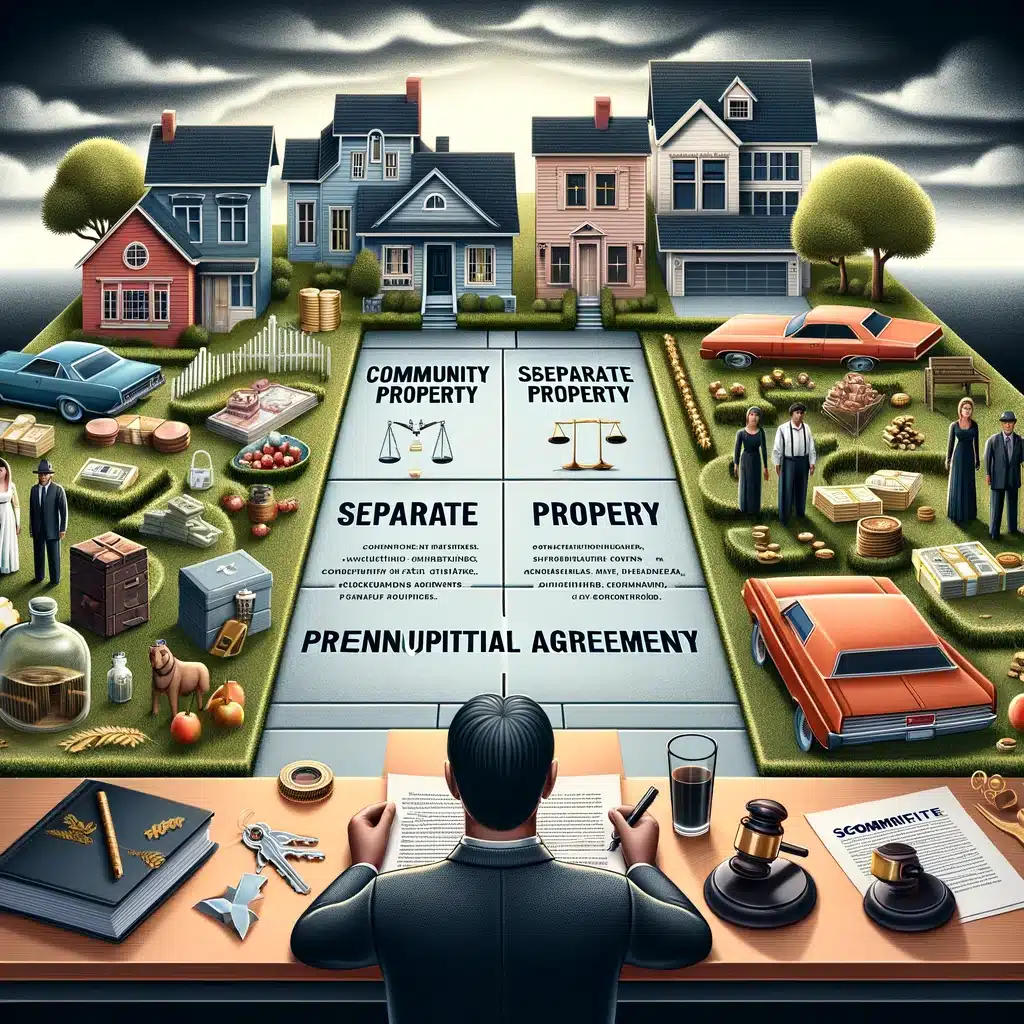
In Texas, divorces involve a complex process of dividing community property and debts. Texas Divorce Overview: Dividing Community Property and Debts delves deeply into these legal intricacies. It’s designed to guide readers through the multifaceted aspects. Of Texas’s divorce laws, focusing on property and debt division.
Welcome to the Lone Star State of Affairs: Navigating Texas Divorce
Picture this: You’re at a Texas BBQ, the aroma of brisket in the air, and your friend leans over to whisper, “I’m getting a divorce.” Suddenly, the talk turns from smoked meats to splitting assets. Welcome to the complex world of Texas divorces, where dividing community property and debts is a dance more intricate than the two-step!
Why Should You Keep Reading?
Ever wondered what happens to your prized BBQ smoker if you split? Or who gets saddled with the credit card bills from those Austin nights? That’s exactly what we’re diving into. This article is your map through the tangled territory of Texas divorce laws. We’ll cover everything from the legal nitty-gritty of community versus separate property to the less-talked-about, yet crucial, aspects like debt division and tax implications. Plus, we’ll spice it up with real-life scenarios, just like your friend’s at the BBQ.
So, What’s the Deal with Texas Divorces?
In short, Texas treats most assets and debts acquired during marriage as a shared hoedown. But, as we’ll see, the devil is in the details. Stay with us as we guide you through this intricate dance, ensuring you don’t step on any legal toes!
Understanding Community Property Law in Texas
Texas stands as a community property state. This means that most property acquired during marriage is deemed owned jointly by both spouses. However, the law also recognizes separate property, primarily assets acquired before marriage or through inheritance.

Separate vs. Community Property
Distinguishing between separate and community property is a pivotal step in divorce. Separate property includes pre-marriage assets, inheritances, and gifts. Community property encompasses earnings and property acquired during the marriage. Accurate categorization is essential for fair division.
|
Separate Property |
Community Property |
|
Assets owned before marriage |
Earnings and property acquired during the marriage |
|
Inheritances received, even during marriage |
Debts incurred during the marriage |
|
Gifts given specifically to one spouse |
Real estate purchased while married |
|
Personal injury awards (except for loss of earnings) |
Investments made during the marriage period |
|
Property bought with separate funds or exchanged for separate property |
Furniture and appliances bought during the marriage |
Legal Process of Divorce in Texas
The divorce process initiates with a legal petition filing. It’s followed by serving the petition to the other spouse. The court then steps in if parties can’t agree on property division. Judges consider each spouse’s financial situation and contributions to the marriage.
Debt Division in Texas Divorces
Texas law also mandates the division of debts. Debts incurred during the marriage are generally considered joint liabilities. This includes credit card balances, mortgages, and car loans. Understanding debt division helps in financial planning post-divorce.
Property Valuation and Division
Accurate property valuation is crucial. It involves assessing real estate, personal belongings, and investments. Professional appraisals often determine property value. These valuations are critical for equitable division.
Tax Implications of Property Division in Divorce
Divorce property division can carry significant tax implications. For example, transferring property ownership may lead to tax liabilities. Understanding these implications is vital for informed decision-making.
Marital Agreements and Their Impact on Property Division
Pre and postnuptial agreements can dictate property division. These agreements can override Texas’s default community property rules. They often protect specific assets or set unique division terms.

Case Studies of Property Division in Texas Divorces
Real-life scenarios, like the division of a jointly-owned business, illustrate complex decisions. Options include selling, co-owning, or one spouse buying out the other. These cases highlight the complexity of property division in divorce.
Role of Mediation in Divorce and Property Division
Mediation offers a less adversarial approach. Couples can negotiate terms outside the courtroom. This process often leads to more amicable settlements. Mediation typically results in mutually agreeable solutions.
Rights of Spouses in Property Division
Spouses have rights to equitable shares and to retain separate property. Awareness of these rights is crucial for effective self-advocacy during divorce proceedings.
Impact of Infidelity or Other Marital Issues on Property Division
Marital misconduct, like infidelity, can affect property division. Courts may consider such factors, especially if they led to financial repercussions.
Advice for Protecting Your Interests in Property Division
It’s essential to protect your interests. Keep detailed records of all assets and debts. Consulting financial and legal experts can significantly influence property division outcomes.
Navigating the Complexity of Community Property
Understanding Texas’s community property law can be challenging. Community property typically includes wages earned, property bought, and debts incurred during marriage. Separate property, however, is not subject to division. This includes property owned before marriage, gifts, and inheritances.
Division of Specific Assets
Dividing specific assets like retirement accounts requires careful consideration. Retirement accounts accrued during the marriage are community property. Division must consider the type of account and applicable laws.

Handling Business Assets
Divorcing couples with shared business interests face unique challenges. The business must be valued, which can be complex. Options include selling the business, one spouse buying the other out, or continuing joint ownership.
Considerations for High-Asset Divorces
High-asset divorces involve more complexities. They often include a variety of assets like stocks, bonds, and real estate investments. High-asset divorces require meticulous valuation and legal strategy.
Children’s Impact on Property Division
When children are involved, their welfare becomes a crucial consideration. This can influence the division of the family home and other assets. Ensuring children’s stability often guides these decisions.
Avoiding Common Pitfalls in Property Division
Common pitfalls in property division include underestimating asset value and overlooking debts. Avoiding these mistakes requires thorough preparation and expert advice.
The Role of Expert Witnesses
In complex cases, expert witnesses like appraisers and financial analysts can provide critical insights. They offer objective evaluations of assets, which can be pivotal in court proceedings.
Appealing a Property Division Order
If one party believes the division was unfair, they can appeal the court’s decision. However, appeals are complex and require strong legal grounds.
Preparing for Property Division in Divorce
Preparation is key to a favorable outcome. Gathering financial documents and understanding your assets and debts is vital. Consulting with a skilled attorney early can make a significant difference.

In summary
Dividing community property and debts in a Texas divorce requires navigating a web of legal complexities. Understanding your rights and the intricacies of the law is crucial. With proper guidance and preparation, couples can achieve fair and equitable outcomes. This comprehensive overview aims to empower readers to approach their divorce with confidence and clarity.
Wrapping Up: The Texas Two-Step of Divorce
So, we’ve reached the end of our Texas-sized journey through the maze of divorce laws. Just like finding your way out of a Houston traffic jam, navigating a Texas divorce can be tricky, but now you’re equipped with a GPS full of legal know-how!
The Takeaway?
Dividing assets and debts in a Texas divorce is a dance that requires rhythm, grace, and a good sense of direction. Remember, it’s not just about who gets the barbecue grill or the cowboy boots; it’s about understanding the legal steps to ensure a fair shake.
Why You’ll Remember This Read
Think of this article as your dance partner in the waltz of community property and debts. We twirled through the nitty-gritty of property division, sidestepped through the complexities of debts, and even dipped into the nuances of Texas law.
Parting Thought
As you swing back into your daily life, keep these insights handy. Who knows, the next time you’re at a Texas BBQ and divorce comes up, you’ll be the sage of property division, doling out wisdom with a side of brisket!

Other Related Articles:
- What is community property in Texas?
- How is Community Property Divided in a Divorce in Texas?
- What Every Entrepreneur Needs to Know About Community Property Division
- Community Property in Texas: What you need to know before you get divorced
- What happens if you and your spouse mix community and separate property?
- Community Property Essentials for Texas divorces
- Community Property and Credit in Texas Divorces
- Family Law Cases in Texas: Marital Property and the Community Presumption
- The community estate in a Texas Divorce: Where is all of our stuff going?
- Overview of the steps in a Texas Divorce
Frequently Asked Questions
Is debt divided in Texas divorce?
Yes, debts incurred during the marriage are typically considered joint liabilities and are divided between the spouses.
How is community property divided in a divorce in Texas?
Community property, including assets and earnings acquired during the marriage, is divided in a way that the court deems ‘just and right’, which may not always mean equally.
Am I responsible for my spouse’s debt in Texas?
Generally, spouses are responsible for debt incurred by the other spouse during the marriage. This includes joint debts and can extend to individual debts in some cases.
What is the 10 year rule in divorce in Texas?
The 10 year rule in Texas refers to a guideline where spouses may be eligible for spousal maintenance if the marriage lasted 10 years or longer, and the requesting spouse lacks sufficient property or ability to provide for their minimum needs.
Bryan Fagan, a native of Atascocita, Texas, is a dedicated family law attorney inspired by John Grisham’s “The Pelican Brief.” He is the first lawyer in his family, which includes two adopted brothers. Bryan’s commitment to family is personal and professional; he cared for his grandmother with Alzheimer’s while completing his degree and attended the South Texas College of Law at night.
Married with three children, Bryan’s personal experiences enrich his understanding of family dynamics, which is central to his legal practice. He specializes in family law, offering innovative and efficient legal services. A certified member of the College of the State Bar of Texas, Bryan is part of an elite group of legal professionals committed to ongoing education and high-level expertise.
His legal practice covers divorce, custody disputes, property disputes, adoption, paternity, and mediation. Bryan is also experienced in drafting marital property agreements. He leads a team dedicated to complex family law cases and protecting families from false CPS allegations.
Based in Houston, Bryan is active in the Houston Family Law Sector of the Houston Bar Association and various family law groups in Texas. His deep understanding of family values and his professional dedication make him a compassionate advocate for families navigating Texas family law.




